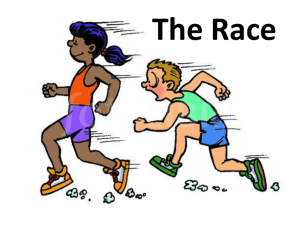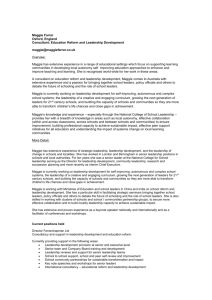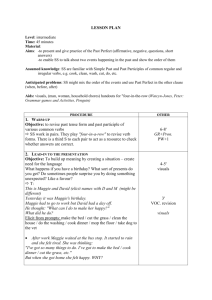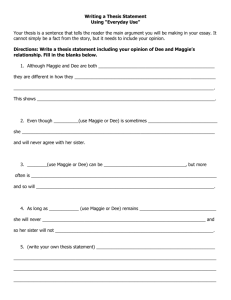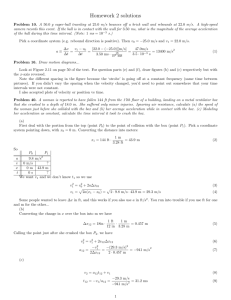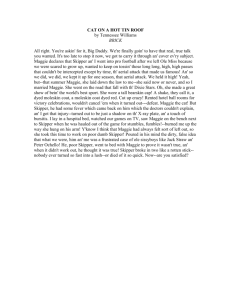Higher english Men Should Weep character summary – Andrews
advertisement
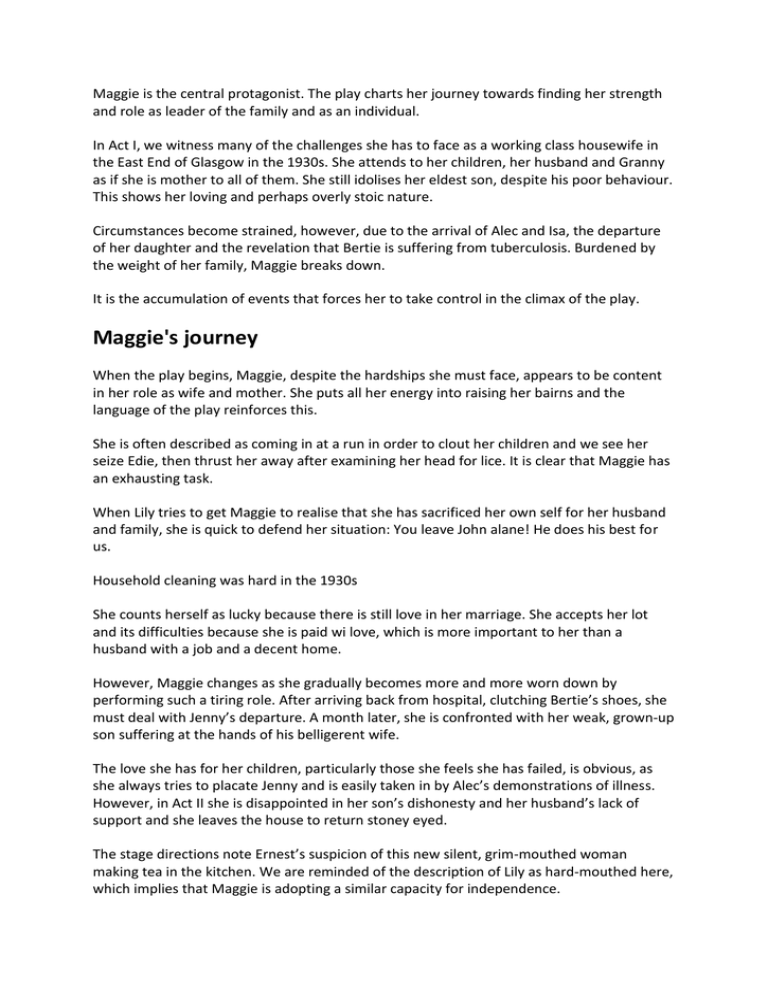
Maggie is the central protagonist. The play charts her journey towards finding her strength and role as leader of the family and as an individual. In Act I, we witness many of the challenges she has to face as a working class housewife in the East End of Glasgow in the 1930s. She attends to her children, her husband and Granny as if she is mother to all of them. She still idolises her eldest son, despite his poor behaviour. This shows her loving and perhaps overly stoic nature. Circumstances become strained, however, due to the arrival of Alec and Isa, the departure of her daughter and the revelation that Bertie is suffering from tuberculosis. Burdened by the weight of her family, Maggie breaks down. It is the accumulation of events that forces her to take control in the climax of the play. Maggie's journey When the play begins, Maggie, despite the hardships she must face, appears to be content in her role as wife and mother. She puts all her energy into raising her bairns and the language of the play reinforces this. She is often described as coming in at a run in order to clout her children and we see her seize Edie, then thrust her away after examining her head for lice. It is clear that Maggie has an exhausting task. When Lily tries to get Maggie to realise that she has sacrificed her own self for her husband and family, she is quick to defend her situation: You leave John alane! He does his best for us. Household cleaning was hard in the 1930s She counts herself as lucky because there is still love in her marriage. She accepts her lot and its difficulties because she is paid wi love, which is more important to her than a husband with a job and a decent home. However, Maggie changes as she gradually becomes more and more worn down by performing such a tiring role. After arriving back from hospital, clutching Bertie’s shoes, she must deal with Jenny’s departure. A month later, she is confronted with her weak, grown-up son suffering at the hands of his belligerent wife. The love she has for her children, particularly those she feels she has failed, is obvious, as she always tries to placate Jenny and is easily taken in by Alec’s demonstrations of illness. However, in Act II she is disappointed in her son’s dishonesty and her husband’s lack of support and she leaves the house to return stoney eyed. The stage directions note Ernest’s suspicion of this new silent, grim-mouthed woman making tea in the kitchen. We are reminded of the description of Lily as hard-mouthed here, which implies that Maggie is adopting a similar capacity for independence. This pre-empts the scene in which she cries hysterically and collapses in a storm of weeping. Perhaps through exposure to Lily, and to the younger generation of females, Maggie begins to recognise her life for what it is. So in the final scene, we see a character motivated to take control, able to first humiliate and then manage her sensitive husband, so that she can make her forgotten long-ago dream a reality. Lily The character of Lily provides an interesting parallel to Maggie. As a spinster, she is independent and without the burdens of children and keeping a family home. She has feminist views and is not afraid to speak her mind. This may seem commonplace for us, but would have shocked a 1947 audience. Lily looks out for Maggie by supporting her and bringing her gifts of food and medicine for Bertie. She does not understand Maggie’s tolerance of John, and, as a result, often reveals her disapproval. However, despite her animosity, Lily loves her sister and wants to see her living a better life. Lily the feminist Lily’s views would have been controversial in post-war Scotland. Whether it is because of an early disappointment to which Maggie alludes, she is very cynical about men and refuses to be a slave to them, which she feels is the consequence of marriage. She tries to make Maggie and the audience aware of a wife’s predicament in an age when birth control was not widely practised. Lily blames John for giving Maggie a the weans; thus perpetuating her slavish existence. The limitations on women in the 1930s are apparent in the comments she makes about John: Yin o they days your loving Johnnie’s gonna tak a look at whit he married and it’ll be ta-ta Maggie. Despite its harsh tone and its bitterness, Lily’s warning rings true, especially when we consider John’s mildly flirtatious behaviour with Isa, which Maggie refers to later on. Lily’s role therefore, is to get Maggie to literally and metaphorically look in the mirror in order to assert her own self. She is delighted when Maggie humiliates her husband at the end of the play as we can see from the stage directions: Lily, arms akimbo, eyes a-gleam, laughs coarsely, and hugs herself. Her physical stance with arms akimbo is one of victory and her gleaming eyes suggest the frisson of joy she experiences at watching such a man shamed by his wife. Ironically, her elation here is not supportive of Maggie who is clearly upset and immediately regretful of her outburst. Instead Lily simply takes pleasure in seeing a man suffer, which confirms her unflinching feminist mind-set. John Despite the fact that the audience is angered by John’s chauvinistic mentality, we still empathise with his character to an extent. Living in poverty, unable to find work, John cannot provide for his family and has an awareness of his responsibility in the hardship the whole family must suffer. John does love Maggie, and there are poignant scenes when he gives her a plate of beans and buys her a hat at Christmas. However, he is still unprepared to deviate from what he considers to be the male role and at several points he disappoints as result. We are also concerned by his softness towards a character like Isa and the fact he does not accompany Maggie to the hospital with Bertie– the one place that she is fearful of. At the end of the play, he suffers a threefold humiliation: his unrepressed sexual desire is exposed by his wife Lily reveals the truth about how much financial assistance she has given his family over the years he is forced to step back as Maggie takes control. Unlike Maggie, John is not strong enough to actively confront his true self and we leave him slumped and speechless at the close of Act III. John and traditional male role When John first enters in Act 1, Scene 1, the stage directions tell us about him and his relationship with his wife. John comes in carrying books under his arm. He is a big, handsome man. He puts down his books, gives Maggie a pat: they exchange warm smiles. John is carrying books, which implies an attempt at self-improvement, but this may be something he simply carries, totes around, like hollow good intentions. Stewart notes his attractive appearance – unlike what Lily tells us about Maggie, John has not lost his looks, making him still sexually appealing to women like Isa. He gives Maggie a pat which connotes the warmth in their relationship while at the same time implying a certain assumed superiority in his manner. Shortly after his entrance, he criticises women for having nae system. The muddle in which they live would be ordered and structured if it wis (his) job... but thankfully for John, it’s no (his) job and he cannot see beyond this, even when his wife is exhausted and struggling to keep going: I’m no turnin masel intae a bloomin skivvy! I’m a man! It is his pride at stake here, and we see this again when he refuses to accept Jenny’s money in Act III: We’re wantin nane o yer whore’s winnins here. John’s anger is because he realises he has failed in the role he is so set on maintaining. He has identified himself as the man, the heid of this hoose, but has done nothing to fulfil this role. Ironically, after this assertion, he becomes a passive spectator with his face in his hands. We wonder whether he is indeed weeping (as he should be) at the realisation of his ineffectiveness while the women take charge. Representative of the younger generation, Jenny feels trapped within the oppressive family home, reminding us of the way Lily and perhaps even Maggie herself was when younger. Jenny has dreams and motivation to move beyond the financial restrictions of her upbringing. She is John’s favourite and provokes his anger when she leaves, as he is horrified at her liberal behaviour. He also feels guilty for not being able to provide for her properly. Jenny departs in Act II as the attitudinal and rebellious daughter and returns regretful, ready to make amends. Her promise of a new home and new life gives the play its optimistic ending, and sets the scene for Maggie’s transformation. Jenny’s role We hear a lot about Jenny before she enters the play as we wait, along with her mother and father, for her to return home. Unlike Isa, who is dismissed by all the characters bar one, Jenny was once a kind wee lassie, but she has become embittered by life in a pig-sty. When she finally enters she is somewhat unkempt after her night on the town: made up boldly( for the 1930s): her lipstick is spread over her mouth, her coat and blouse undone, her hair tousled. The boldness of her make-up reflects her confident challenging of the status quo, while her dishevelled state with spread lipstick and undone clothing implies her uninhibited sexual behaviour as well as reminding us of the muddle that she has grown up in. Jenny asserts herself in front of her father, declaring that she plans to give up her job I’m chuckin the shop with no concern for her family. Hurtfully, she dismisses any duty she might have to her parents in favour of striking out on her own: It’s no ma job tae keep your weans. It’s yours. This, on top of the threat she presents to John’s pride, provokes the physical conflict when John hits her. In Act III, when Jenny reappears, she is much changed. No longer dressed in tarty clothes, she has come to make amends for the mistakes of her past. We see her with head bent listening to John’s chastisement. Rather than bringing the play full circle, her return at the end signals a new beginning for the Morrisons, thus making her an important character. Alec and Isa Alec and Isa provide a contrast to John and Maggie. Alec embodies John’s weaker qualities. He is lazy and feeble, and lashes out (sometimes violently) when provoked by his recalcitrant wife. Described by Maggie as delicate, Alec has dedicated his life to Isa and cannot handle the thought of her leaving him. Essentially he is spoilt and takes advantage of his mother’s love for him – when he wants cigarettes and attention from Maggie we see him play-acting for all he’s worth and later he craftily slinks out with most of the money from Maggie’s purse, which suggests he has an insidious nature that shocks his mother. Although she has a strong spirit and is by no means controlled by her husband, Isa is an almost grotesque character. She is disliked by most and is constantly rude to Maggie. Her sexual appetite is apparent, and we are perturbed by the advances she makes towards John, her father-in-law. Unlike his mother, Isa does not submit to Alec’s demands and is constantly admonishing him. For her, independence does not come from gender equality. Rather, she is prepared merely to leave one marriage to find another man who can provide for her financially. She declares that she likes a man tae be a man. Staun up for hissel – not a trait of her feeble husband. Granny Granny represents the plight of the elderly. She is shunted between Maggie and Lizzie’s house and is a burden to the family. Maggie treats her like one of her bairns: cut oot the music Granny, ma heid’s splittin. Time you wis in yer bed. Aware of her lack of purpose, we often see her whining and rocking and wishing her time away Oh, it’s time I wisna here! Granny allows us insight into other characters. Isa treats her with disrespect and Lizzie is only interested in her money – both characters that do not engender sympathy from the audience. Granny also offers moments of comic relief. When Maggie is hurt at Lily’s reaction to her new hat, Granny provides a diversion by dropping her biscuit into her tea. While providing humour it also reveals a perceptiveness which is hidden by her caricatural posturing. The neighbours Mrs Wilson, Mrs Bone and Mrs Harris act as a Greek chorus in the play. They are not part of the Morrison household and yet they flit in and out of it helping with Granny, giving commentaries on the events while also bringing the outside world into the setting – for instance they bring the news of the collapse of Alec’s flat. They represent the community of the tenements and how folk would lend a hand one minute and gossip about you the next. When Lily gives Maggie gloves for Christmas, Mrs Wilson whispers they cost only "a bob the pair in Woollies", which is a snide remark, and yet in the same scene she expresses genuine concern for Bertie. All three women are married to men who exist off stage, and it is implied that they too have difficult lives to which they return. Mrs Harris’s husband enters in Act III by thudding on the door and shouting through it Is ma wumman there? Well, tell her tae get the Hell oot o it. I’m wantin some atten-shun – to a modern audience this is almost comic, Neanderthal behaviour, but, despite her insistence that she is in charge, she still goes to him. Do these neighbours then have the right to criticise the Morrisons?


